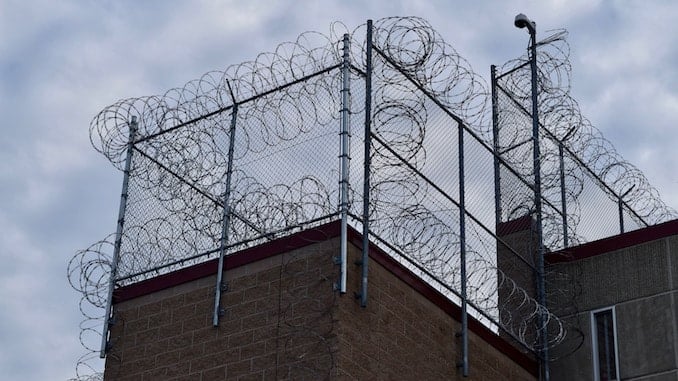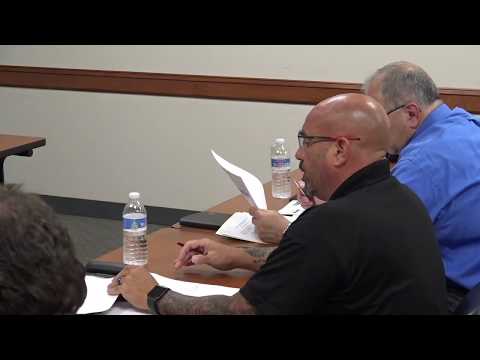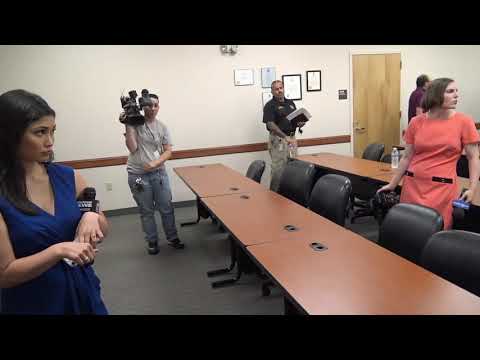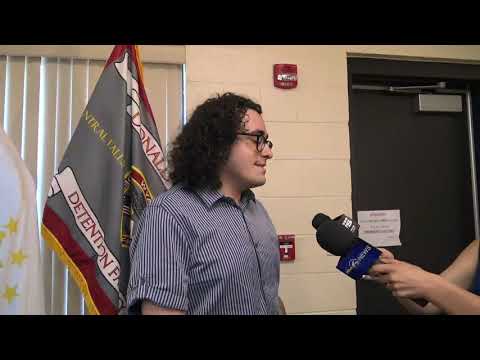Meeting of the Wyatt Board generates more questions than answers
Board members declined to answer questions or talk to reporters, Attorney William O’Gara and Acting Warden Gregory Richard offered some information The July 8 meeting of the Central Falls Detention Facility Corporation Board of Directors, the entity nominally in charge of overseeing the Wyatt Detention Center, started 36 minutes late as those in the room waited for the arrival of
July 9, 2019, 6:32 am
By Steve Ahlquist
Board members declined to answer questions or talk to reporters, Attorney William O’Gara and Acting Warden Gregory Richard offered some information
The July 8 meeting of the Central Falls Detention Facility Corporation Board of Directors, the entity nominally in charge of overseeing the Wyatt Detention Center, started 36 minutes late as those in the room waited for the arrival of the Board’s legal counsel, William E O’Gara from the legal firm Pannone Lopes Devereaux and O’Gara.
“I’m sorry for the delay,” said O’Gara as he took his seat.
Only three of the current four members of the Board, Herman Yip, Wilder Arboleda, and Gary Berdugo, were present for the meeting. Agostinho Silva, who is also a Central Falls City Council member, was absent. Board Chair Joseph Molina Flynn stepped down from his position in late April/early May.
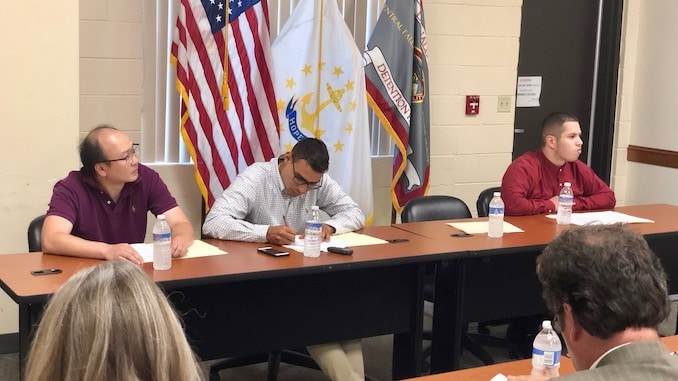
After calling the role and rising for the Pledge, the Board elected Arboleda as temporary Chair, for the purposes of facilitating the meeting. Arboleda asked if anyone wanted to deliver public comments.
“I would like to express concern as the public hasn’t received any information pertaining to whether or not the ICE detainees currently being held at the Wyatt have had access to legal representation or pastoral support,” said Rodrigo Pimentel, a Dreamer and immigration rights activist. “I would like to know whether or not lawyers in particular have been allowed access to the ICE detainees. I know that City Solicitor Matt Jerzyk, and I quote, ‘The Special Master will ensure that the constitutional rights of the ICE detainees at Wyatt will be protected’ and so I want to [know] whether or not that is actually happening.”
There was an awkward pause as Pimentel waited in vain for the Board members to respond.
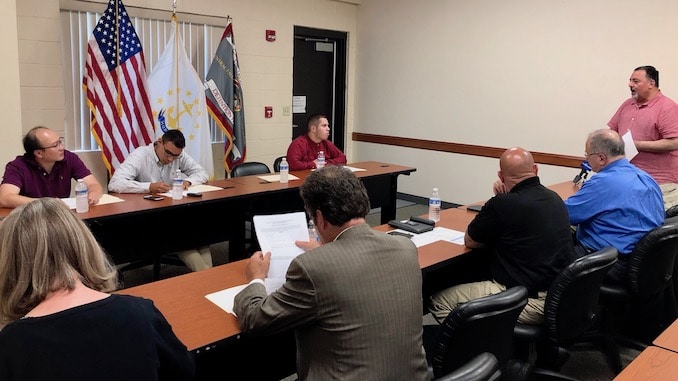
Former Central Falls Mayor Thomas Lazieh, who was instrumental in bringing the Wyatt to the City, spoke next. Lazieh is also a former Central Falls City Council member. Lazieh spoke for over ten minutes and covered a lot of ground. He expressed concerns about the rate of changeover on the Board, and about the continued absence of Board member Silva, questioning whether the Board in fact had a quorum. (For the record, the Board is supposed to have five members, and three members makes a quorum.)
Lazieh’s main thrust was that we wants the Wyatt to be profitable so that the bondholders, those who invested money so that the Wyatt could be built, are repaid, allowing the City to make money from the facility as originally planned. Lazieh stressed that though he objects to national immigration policies as currently enforced under President Donald Trump, “that is the law at this point.”
Lazieh would see the City and the bondholders profit from this law.
Lazieh’s questions also went unanswered by the Board, so I rose to remind the Board that there is no restriction, under the Open Meetings Act, that would prevent the Board members from answering any of the questions posed to the Board during public comment.
The Board voted to close public comment and moved on.
After the approval of the the minutes from the last meeting, Acting Warden Major Gregory Richard delivered the the Report of the Warden.
“The number of ICE detainees in the facility currently is at 139,” said Richard, reading from his report.
After the report from the new Director of Finance, the meeting was adjourned. None of the public’s questions or concerns were addressed, no answers about the status of the detainees was forthcoming.
Immediately after the meeting Channel 12 reporter Shiina LoSciuto asked if any members of the Board were available to answer questions on camera.
“I’m not,” said Counselor O’Gara. “I’m not sure any of these gentleman are either,” referring to the Board members, who looked a little panicked at the prospect.
“Are any of the questions going to be addressed?” I asked.
“Well, some of them were,” said O’Gara.
I pressed the question, particularly about the rights of the detainees as pertains to access to legal counsel and clergy.
“To my knowledge there is not a claim that people have not been getting access…” said O’Gara.
There is no evidence that the ICE detainees are getting their legal and clergy access rights met, I countered. There’s no report saying that this is happening.
“Let me follow up on that,” said O’Gara. “At least to my knowledge that is not an ongoing issue.”
“There was a Know Your rights Training,” said Pimentel, “but Know Your Rights is actually completely different from allowing lawyers to enter the facility [and] conducting credible fear interviews, so is that happening?”
“So is it your understanding that lawyers have shown up and we said ‘you can’t come into the facility?” asked O’Gara, changing the subject.
I explained to O’Gara the Catch-22 situation that the ICE detainees are in when it comes to accessing lawyers: No lawyer can get into the facility without knowing the names of the detainees. The names of the detainees are withheld from the public by the Wyatt, in concert with ICE. (I have an Access to Public Records Act (APRA) request in with the Rhode Island Attorney General‘s office to get the names of the detainees released. The Wyatt, through their attorneys, Pannone Lopes Devereaux and O’Gara, are fighting the release of those names.)
O’Gara claimed that access to clergy is somehow outside his purview.
“No reporter in this state has gotten a single answer on this,” I said, “and I know the ACLU hasn’t gotten an answer on this, either.”
I then asked if the Wyatt Board not answering questions posed from the public is under the advice of counsel.
“As part of the process for the Board conducting the meeting, it’s not typical, in my experience, that the Board respond to questions,” said O’Gara. “Information was provided as part of the presentation on the part of the management that addressed many of the issues that were raised in public comment, but my experience with Boards is that they don’t typically respond to questions…”
“But there’s nothing that prevents them from doing it,” I said.
“No there isn’t,” said O’Gara. “But by the same token there isn’t a legal obligation to do that.”
“But it does seem to talk to the openness of the Board if they don’t right?” I countered. “If they don’t answer questions, maybe it seems like they have something to hide, or don’t want to answer for other reasons.”
“That wouldn’t be my interpretation, that this Board is trying to hide something,” said O’Gara. “I don’t see that.”
“I understand,” I said. “But you can see that the public might think there’s something going on if we can’t get answers to simple questions…”
“I know people want some sort of reaction about the protests,” said Channel 12 reporter LoSciuto. “There’s reasons that people are coming out here. Are you sure there’s nothing you can tell us, to relay a message?”
“That wouldn’t be my role,” said O’Gara.
“Who can I ask?” asked LoSciuto.
“I don’t know,” said O’Gara.
“That’s the problem, right?” I asked. “If it’s not your role, if it’s not the Board, whose role is it?”
“I’m not sure,” said O’Gara.
“Yeah,” I said, “That seems like a black box, that there’s no answers coming from.”
Meanwhile, 139 people sit inside the Wyatt, their status uncertain.
“I came here today because I have concerns as to whether or not the ICE detainees here at Wyatt have had access to legal representation, whether lawyers have been able to get in and actually help people with their asylum claims,” said Rodrigo Pimentel after the meeting. “That is why I was here and unfortunately the Board did not answer those questions tonight.”
It seems that that’s a recurring theme, people not getting information,” said Channel 12’s LoSciuto. “I’m sure that’s worrisome?”
“It is worrisome,” said Pimentel. “The Board is accountable to the public…”
Pimentel went on to address some of the concerns brought up by former Central Falls Mayor Thomas Lazieh during public comment.
“It’s upsetting that some people want to see the facility open to produce profit,” said Pimentel. “And they’re putting profit before people. Ultimately, people’s rights go first, before monetary profit. If you want to invest in a detention facility, and then the laws change, well, perhaps you should have invested in an index fund.”
As I was pulling out of the parking lot of the Wyatt, Attorney O’Gara and Acting Warden Major Gregory Richard called out to me. I pulled over and was joined by Providence Journal reporter Kevin Andrade and ABC 6 reporter Brittany Comak.
Richard wanted to answer some of the concerns brought up by the public and by reporters at the meeting. He started by saying that the religious needs of the detainees are being met with regular services, translated into Spanish, and that the services cover a wide variety of denominations.
“We never turn anybody away,” said Richard, talking about legal counsel or family members who arrive at the prison to see ICE detainees. “Now, pro bono attorneys, I have not yet seen anybody sent away. Our policy is this: If an attorney comes in there and we’re not going to let them in, they have to either contact the Warden, contact myself, or the other major.
“I’m the Acting Warden here for the last couple weeks. No one’s called me down or said we’ve rejected anybody,” said Richard. “It’s sometimes hard for me to sit in these meetings and I’m listening and especially with the religious services – that’s not true. We do have services, from day one.”
“That’s why we need answers to these questions,” I said. “No one will respond to these very simple questions.”
“Well, I can’t speak on that,” said Richard. “I’m internal. I’m in the house. I’m in those units every single day with them, speaking with them, in and out, so when I hear certain things I think, alright, so what can we say, what can I say?”
“Let me explain how the system works,” said Richard. “So if you’re Mr O’Gara coming in here and he just wants to see detainee Bob, if he’s not Bob’s attorney on record, he’s not allowed to see him. And that’s how that works. Once a detainees says yes, he’s here to represent me, then that attorney’s going to be allowed in. We just don’t let any attorney come into the facility to speak to any detainee. It’s a process.”
“I know it’s a process,” I countered. “I also know that’s a difficult process because the names of the people in there are not known. I couldn’t get the names of people who are being held. Any other prison in the state, I want to know who it is, I go online, I find it.”
As for the conditions of the facilities for the ICE detainees at the Wyatt, “We just had our audit,” said Richard. “Outstanding. We have to meet a certain goal. It’s not like they’re put in there and we turn our back.”
“But I talk to people who say that an outstanding ICE rating, given the conditions in facilities down south…” I began.
“You can’t even compare them,” said Richard.
“Because there’s no open communication, the public doesn’t know that,” I said.
“For me,” said Richard, not wanting to get too deep into this subject, “We’re providing the ICE detainees with a safe port. Right now they’re getting their meals, their services, their phone call, over and above, their services in here. If you went in there and actually saw them you’d be shocked.”
“How would we go about going into see them?” asked ProJo reporter Andrade.
“That’s on the Warden,” said Richard.
“Could the Acting Warden give permission for that?” I asked.
“No. That would have to be the Warden. He’s back at the end of the month.”
See also:
- Wyatt board holds first meeting since protest by Shiina LoSciuto at Channel 12
- First board meeting since protests at Wyatt Detention Facility by Brittany Comak at ABC 6.
See also:
- Never Again Is Now: 18 people arrested protesting ICE and concentration camps outside the Wyatt Detention Center
- FANG visits the Wyatt Detention Facility’s “Special Master” at Locke Lord LLC
- Judge orders that ICE detainees can be held at the Wyatt
UpriseRI is entirely supported by donations and advertising. Every little bit helps:
Become a Patron!



